FYI: If you buy something through a link on this site I may earn a commission - at NO extra cost to you.
Dog Bladder Infection 101
A dog bladder infection can be painful and distressing for your dog.
A urinary tract infection like this can even completely prevent your dog from urinating by blocking the urethra. This is a medical emergency and potentially life threatening!
A simple bladder infection caused by an overgrowth of bacteria can usually be cleared up pretty quickly with a round of the correct antibiotics prescribed by your veterinarian.
But there are sometimes other factors or complications which occur and it's vital to have your vet make an accurate diagnosis so that treatment is effective.

About Dog Bladder Infections
Dog urinary problems such as UTI's are more common in female dogs than in males. Puppies are also at a slightly higher risk.
This is because female dogs, and puppies, have short urethras which allow bacteria to travel through them to the bladder fairly easily.
Occasionally a physical problem with the vulva (obviously only in females), bladder or urethra can cause repeated UTI's in dogs.
Injury, hormone imbalances, cancer, diabetes, kidney problems or prostate issues can cause bladder problems in both male and female dogs.
Certain medications can also play a role in causing crystals or stones to form. These include corticosteroids and certain canine heart medications.
In male dogs, bladder problems are less likely to be caused by bacteria than in females.
Some breeds are predisposed to develop bladder stones or crystals (there are two common types of stones) which can cause, or be the result of, a dog bladder infection. These include:
- English Bulldogs
- Dalmatians
- Russian Terriers
- Newfoundlands
- Scottish Deerhounds
- Miniature Schnauzers
- Miniature Poodles
- Yorkshire Terriers
- Shih Tzus
- Dachshunds
- Cavalier King Charles Spaniels
There are two main types of bladder stones and the presence of either of them can cause a bladder infection, or be the result of one.
Because any dog can develop this condition at any age, it's important for dog owners to be able to recognize the signs
Dog Bladder Infection Symptoms
Your dog can't tell you that it hurts or burns when she/he pees, or that she feels achy or shivery.Fifi can't even tell you if she's in so much pain that it feels as though her bladder will burst.
Fortunately there are some symptoms of canine urinary tract infection which are pretty easy to spot:
Frequent Urination
A dog with a bladder infection is going to feel the urge to pee much more often than normal. Sometimes she may only pass a few drops each time.
Straining, whimpering or repeated squatting to pee, with little to show for it, are common.
Your dog's urine may look cloudy, have an unusual smell (may smell 'strong'), or be tinged with blood (see below).

Housebreaking Accidents
A urinary infection causes such an intense urge to pee that your dog is likely to be unable to control her bladder.
Sudden 'potty training accidents' in a previously house-trained dog are often a sign of a bladder infection, or other physical bladder problem.
Your dog may also dribble or leak urine when sleeping, or even when awake.
Bloody Urine
If your dog has a urinary tract infection it is likely to cause a LOT of irritation and inflammation in the urethra and bladder.
This leads to bleeding which can often (but not always) be seen in her urine.
It may be just a trace of blood, or in more severe cases her urine may be pink or even red.
Licking at the genital area
In an attempt to relieve the itching and burning she feels, your dog may lick at her privates quite obsessively.
Intense licking at the genital area, sometimes accompanied by whining, is often a sign of a bladder infection in dogs.
Generally Feeling Unwell
If Fifi has a bladder infection she is going to be feeling pretty unwell.
She's in pain, needs to pee ALL the time and may well have a fever, which is all miserable for her.
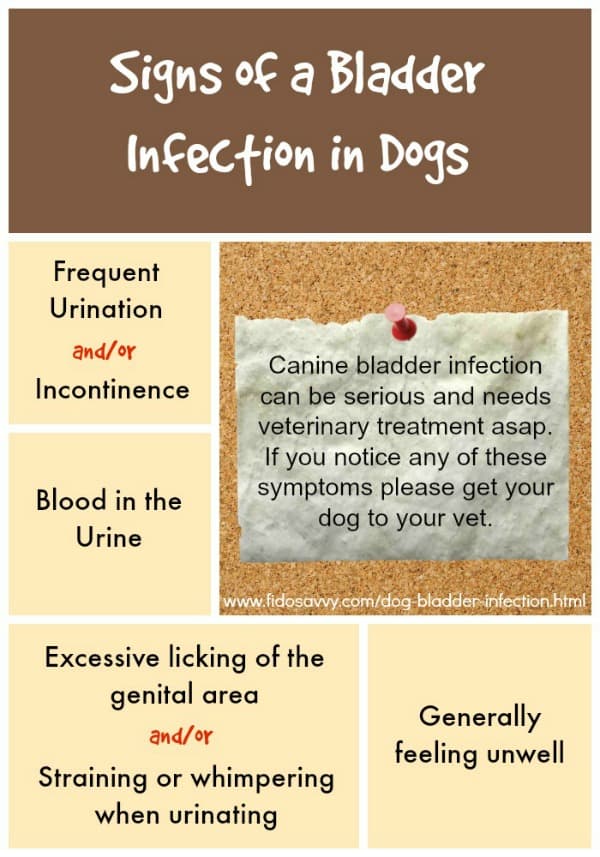 NOTE: These symptoms can also indicate illnesses or health conditions. If your dog is seems unwell, always have him examined by your veterinarian right away.
NOTE: These symptoms can also indicate illnesses or health conditions. If your dog is seems unwell, always have him examined by your veterinarian right away.Dog Bladder Infection Treatment
It's important to be sure that your dog does have a bladder infection before treatment begins, so your vet will run some tests before deciding on a treatment plan.
A urinalysis (checking a sample of Fifi's urine for bacteria and other abnormal elements such as blood, pus, protein or blood) is usually the first step in diagnosing a UTI. Sometimes your vet will also do a blood test to check for kidney problems or other infections.
An X-ray or ultrasound
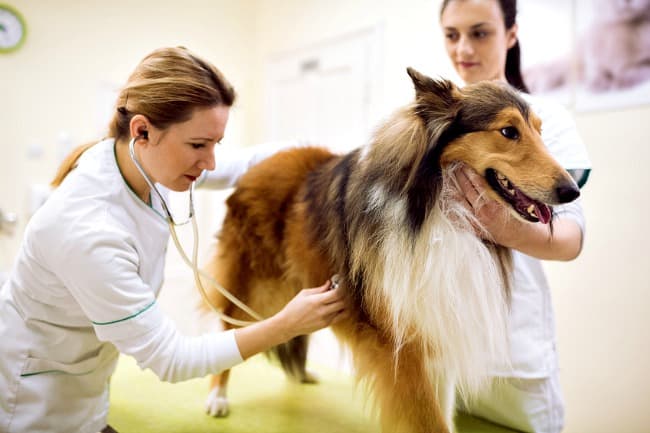
Treating A Canine Bladder Infection
For a dog bladder infection which is caused by bacteria, a round of the correct antibiotics usually fixes things up quickly and effectively.
This is great news for a condition which is as uncomfortable and quick to flare up as a UTI!
It's very important to make sure that your dog takes ALL the prescribed medication, at the right times, so that the bacteria is completely eliminated. Also, if you don't see an improvement within 48 hours, or Fifi seems to be feeling worse, let your vet know asap.
Your dog's urine will most likely be tested again after the full course of medications have been taken, to make sure all bacteria is gone.
Sometimes an anti-inflammatory will be prescribed as well, or medicine to help with the pain.
Making sure your dog drinks plenty of water is also recommended at all times (in fact drinking lots of water can play a role in preventing bladder infection and stone/crystal formation in dogs).
If test results and examination show other problems such as bladder stones (there are two main types of these Struvite and Calcium Oxalate) then they will also need to be treated.
- Bladder stones can sometimes be dissolved with a dietary change (specific, vet prescribed dog food)
- They may be broken down and flushed out by means of a veterinary procedure called urohydropropulsion.
- A vet can surgically remove the bladder stones while Fifi is under general anesthetic.
- Some stones can be broken up using high-frequency ultrasound. The tiny particles are then flushed out of the bladder.*
* This option is not commonly used for pets yet (although it's used in the treatment of stones in humans) but is available at certain clinics.
Your vet will decide which option is the right one for Fifi or Fido depending on the type of bladder stones he/she has,
Common Types of Dog Bladder Stones:
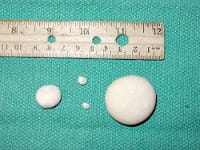 Struvite Bladder Stones
Source: Joel Mills via Wikipedia
Struvite Bladder Stones
Source: Joel Mills via Wikipedia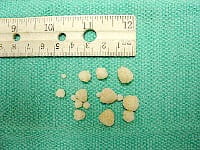 Calcium Oxalate Stones
Source: Joel Mills via Wikipedia
Calcium Oxalate Stones
Source: Joel Mills via Wikipedia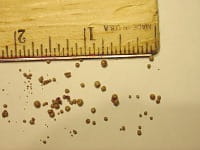 Urate Stones
Source: Joel Mills via Wikipedia
Urate Stones
Source: Joel Mills via WikipediaBladder stones in male dogs are more likely to block the urethra, so removing them quickly and completely is especially important - particularly if there are a lot of stones.
Any other underlying health condition will also need to be treated. This includes conditions such as diabetes or adrenal disease, as well as a physical abnormality or injury.
There are also natural products which can help a dog who is suffering from a UTI, but I wouldn't recommend these as the only treatment. If there is a true infection, antibiotics are needed.
Bladder stones need professional evaluation too and the right treatment. Natural remedies can often be used in conjunction with veterinary treatment and in this situation can be very beneficial.
However there are some natural products which are effective at maintaining good bladder health and prevent UTI's and other bladder problems from developing.
Preventing A Dog Bladder Infection
Although there is no sure-fire, 100% guaranteed, way to prevent your dog from developing a bladder infectionthere are things you can do to lessen the risk. These include:
Increasing her Water Consumption
Make sure your dog always has access to clean, fresh water... and that she drinks it! Drinking enough keeps urine from becoming concentrated and also encourages your dog to pee regularly.
Both of these can help prevent the conditions in which bacteria thrive and/or stones form.
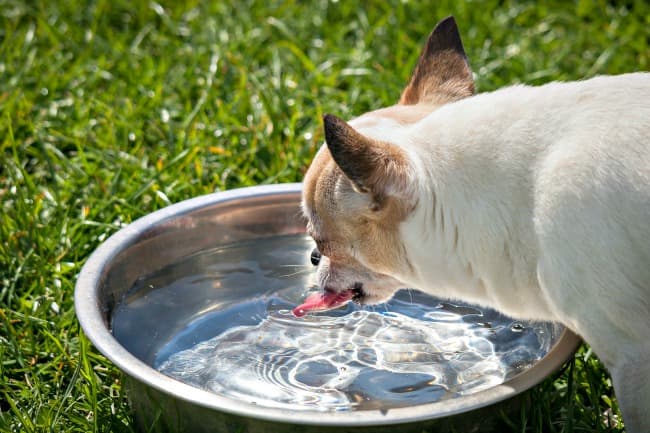
Taking Regular Potty Breaks
If urine sits in the bladder too long it can become an ideal breeding ground for bacteria, so it's important to make sure Fifi empties her bladder regularly, and completely.
Some dogs (and especially puppies) need to pee several times during one potty break.Just because she squats once don't assume she's empty!
Dietary Changes
Certain ingredients in some commercial pet foods are thought to be trigger factors for both common types of bladder stones in dogs (Struvite and Calcium Oxalate).

This is due to the the effect they have on the acid levels of your dog's urine.
Certain dog foods have been designed with this in mind.
These foods are formulated to maintain the correct balance of minerals and a healthy urine pH, both of which your dog needs to keep bladder infections and bladder stones at bay.
Studies have shown that the right diet can prevent dog bladder stones from reforming, so it's a simple but very effective way to keep Fifi safe.
For a dog who has had even one incidence of bladder stones, a prescription diet specifically designed for them is recommended... for the rest of their lives.
Regular Veterinary Check-Ups
As early symptoms of a dog bladder infection or bladder stones can be vague at first, it's important to have your vet test Fifi's urine and do a physical exam regularly.
Catching a problem early means that it's easier, faster (and usually much less expensive) to treat.
Probiotics
Giving your dog probiotics regularly may help.
Studies show that these can prevent bacteria build-up and also support a healthy immune system which fights off infection much more effectively.
At Home Testing
If your dog has had a bladder infection or bladder stones it's important to be vigilant about preventing recurrence... and watching for symptoms of potential trouble.
Testing Fifi's urine at home periodically (or if you think there might be a problem) can give you a head start on getting treatment started
Healthy pH levels in dog urine usually fall somewhere between 6.5 and 7.0
One slightly higher, or lower, reading isn't cause for panic. Simply test again later the same day and you may find the reading is back in the normal range.
But if the pH balance is still off get Fifi to the vet for a professional evaluation.
You can use a complete at-home kit like this one - Urinary Tract Infection Test Kit which gives accurate results in just two minutes.
This kit can detect blood, white blood cells, and nitrite in the urine. Kit contains two tests so you can test again later if needed.
For quick and easy collection of Fifi or Fido's urine, use the P-scoop Dog Urine Collector.
The PawCheck Test Kit can detect a dog bladder infection as well as indicators of diabetes and kidney failure.
Again, test results are available in two minutes and two test kits are provided.
Or you can buy urine testing strips which change color depending on the acid/alkali balance of the urine you collect, such as Solid Gold Urine pH testing strips for Dogs & Cats
 Our Winnie xx
Our Winnie xxI have personal experience of dealing with a dog who has a bladder infection... and also bladder stones.
Several years ago after several recurring bladder infections we found out that our Olde English Bulldogge, Winnie, had bladder stones
After treating the infection, she had surgery to remove the stones and has been on a special, veterinary recommended diet, ever since - and will be for as long as she lives.
Given the dangers, not to mention discomfort, of repeated infections and surgery to remove stones, this seems like a small price to pay for her good health. I'm happy to say that she is 100% healthy, and has been every since.
Shortly afterwards one of our cats, Patrick, had a life-threatening experience with bladder stones which had completely blocked his urethra. His symptoms were vague and if it hadn't been for a gut feeling that something was wrong, that I couldn't see, we would have lost him.
It was touch-and-go but he survived and is healthy again and is also on a life-long prescription diet.
Keeping Your Dog's Bladder Healthy
Here are a few products which given regularly can help keep Fifi and Fido's bladders healthy, hopefully preventing bladder infections and/or bladder stones from developing.
Here are some natural products that help promote good bladder health in dogs:
- Amazing Cranberry Chews for Dogs
- K9 Bladder & Kidney Support
- Cranbladder Health for Dogs
- PetWellbeing Urinary Gold
- Proviable-DC Probiotics for Dogs & Cats
- VetriScience Probiotic Everyday
you might also like...
- Home
- Illnesses & Disease
- Dog Bladder Infection
FTC Disclosure: Some pages on this site contain affiliate links. I may earn on qualified purchases.





